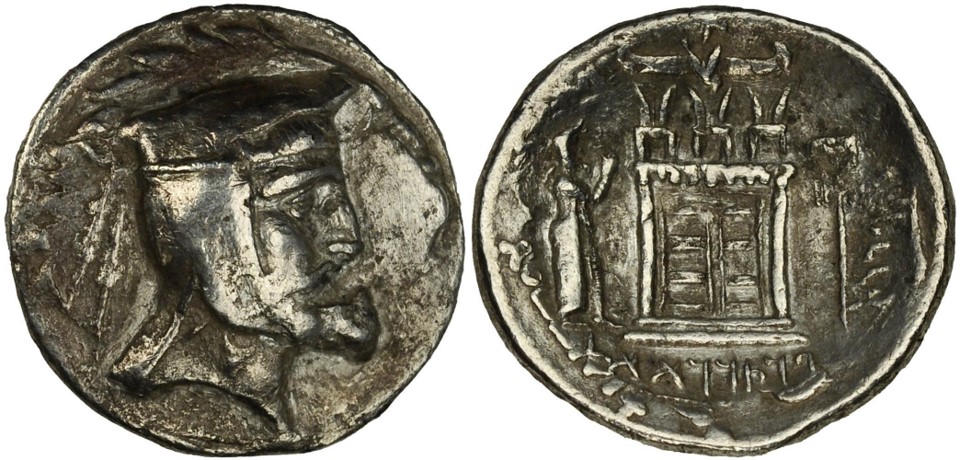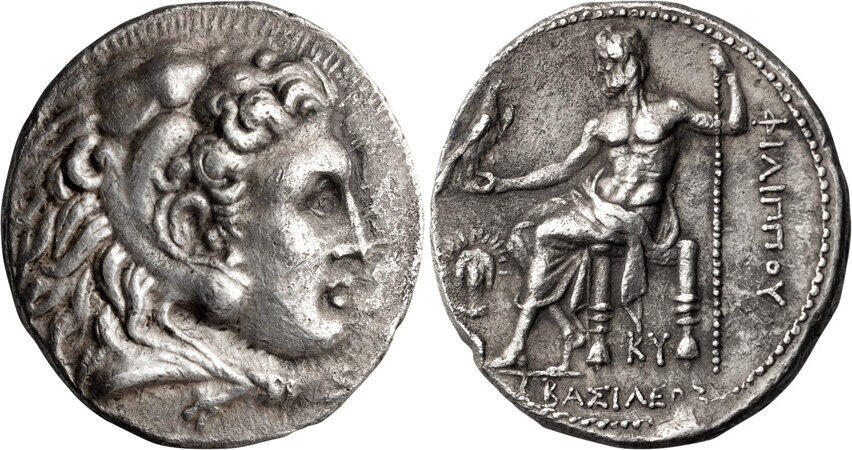240 BCE - 220 BCE | "Vadfradad, the Frataraka of the Gods, Son" (Aramaic)
Overstriking coin
Vadfradat_Ponterio,_151,_12_Nov._2009,_8139.jpg
[1]
|
|
Sale(s)Sale(s) ᵖ:
|
Ponterio, 151, 12 Nov. 2009, 8139
|
|
|
|
Description
| ObverseInscription or printing placed on the obverse.:
|
Head of Autophradates right, wearing earring, satrapal cap (kyrbasia) and diadem. Border of dots.
|
ReverseInscription or printing placed on the reverse.:
|
"Vadfradad, the Frataraka of the Gods, Son" (Aramaic) (Aramaic) Fire Temple with half-figure of Ahura-Mazda. To left, satrap standing right, in prayer. To right, standard. Border of dots.
|
Mint and issuing power
| MintIdentifies the place of manufacture or issue of a numismatic object.:
|
Istakhr (Persepolis)
|
Ancient regionAncient region.
|
Persis
|
Modern countryModern country: Iran
|
AuthorityIdentifies the issuing power. The authority can be "pretended" when the name or the portrait of X is on the coin but he/she was not the issuing power. It can also be "uncertain" when there is no mention of X on the coin but he/she was the issuing power according to the historical sources:
|
Kingdom of Persis, Vadfradad II of Persis
|
Chronology
| FromIdentifies the initial date in a range assigned in a numismatic context. 240 BCE toIdentifies the final date in a range assigned in a numismatic context.. 220 BCE
|
Hellenistic 323-30 BC  periodTime period of the numismatic object. periodTime period of the numismatic object.
|
Physical description
MetalThe physical material (usually metal) from which an object is made.: Silver 
|
WeightWeight of the numismatic object (in grams). in grams: 16.5116.51 g <br />16,510 mg <br />
|
DenominationTerm indicating the value of a numismatic object. Examples: tetradrachm, chalkous, denarius.: tetradrachm 
|
|
|
|
StandardStandard.: Attic
|
References
Description
| ObverseInscription or printing placed on the obverse.:
|
Head of Herakles r. wearing lionskin
|
ReverseInscription or printing placed on the reverse.:
|
BAΣIΛEΩΣ - ΦΙΛΙΠΠOY (Greek) Zeus seated l. holding eagle and scepter
|
Mint and issuing power
Chronology
| FromIdentifies the initial date in a range assigned in a numismatic context. 323 BCE toIdentifies the final date in a range assigned in a numismatic context.. 317 BCE
|
Hellenistic 323-30 BC  periodTime period of the numismatic object. periodTime period of the numismatic object.
|
Physical description
| DenominationTerm indicating the value of a numismatic object. Examples: tetradrachm, chalkous, denarius. ᵖ:
|
tetradrachm 
|
StandardStandard. ᵖ:
|
Attic
|
References
| Frequency of overstrikesFrequency of overstrikes:
|
frequent
|
Level of confidenceLevel of confidence of the identification:
|
sure
|
| RemarksRemarks:
|
"Overstruck on a Macedonian tetradrachm on Philip III. Very dramatic overstrike with full king's name and lion's scalp visible"
|
References
- ^ Alram, Michael (1986), Iranisches Personennamenbuch. Band IV: Nomina Propria Iranica In Nummis, Vienna.
- ^ Klose, Dietrich O. A. - Müseler, Wilhelm (2008), Statthalter Rebellen Könige - Die Münzen aus Persepolis von Alexander dem Großen zu den Sasaniden, Munich, xii, 90 p.
- ^ Nelson, Bradley R. (2011), Numismatic Art of Persia: The Sunrise Collection Part I: Ancient- 650 BC to AD 650, Lancaster
- ^ van't Haff, Pieter Anne (2020), Catalogue of Persis Coinage, Ca. 280 B.C. - A.D. 228, 2020
- ^ Price, Martin Jessop (1991), The Coinage in the Name of Alexander the Great and Philip Arrhidaeus: a British Museum Catalogue, 2 vol., Zürich-London, 637 p., 637 p., clix pl.

